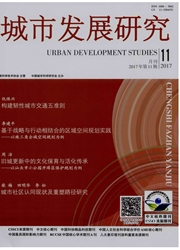

 中文摘要:
中文摘要:
新型城镇化指面向国际国内社会经济新发展和解决我国城镇化面临的实际问题需要,转变过去粗放型、环境不友好、质量不高、宜人性与社会保障性差等局面,走具有环境友好、宜居生态、社会和谐、知识支撑、具有特色的高质量的城镇化发展之路。虽然我国国家总体与省域新型城镇化规划已经出台,实践新型城镇化试点也正在进行,但当前我国新城镇化发展的理论研究还十分不足。对新型城镇化理论进行了系统的探讨:首先,追溯了我国新型城镇化发展研究的基础与进展,并指出现阶段存在的问题与特征;其次,系统分析了新型城镇化的内涵与特征;最后,从新型城镇化方法论、城镇化理论发展新趋势、核心基础理论、推进途径四个方面构建了新型城镇化理论体系。
 英文摘要:
英文摘要:
New urbanization refers to the fact that means to solve the practical problems facing the urbanization in China by transforms the development path to the environmentally friendly,livable ecology and the social harmony,intellectual support way. Although China's overall national and provincial planning has been introduced, new urbanization practice are in progress of urbanization,the theoretical research of the new urbanization of our country is very insufficient. It is of great importance to explore a new model of urbanization. This thesis studies the new urbanization systematically and it consists three parts: firstly, it gives a general introduction to the base and progress of new urbanization in China, and poses the problems and characters of it at the present stage; then it defines concepts and characters of new urbanization systematically; thirdly, it set up the theory of new urbanization in five aspects include methodology, new development tendency of urbanization theory, core basic theory and promoted approach.
 同期刊论文项目
同期刊论文项目
 同项目期刊论文
同项目期刊论文
 期刊信息
期刊信息
